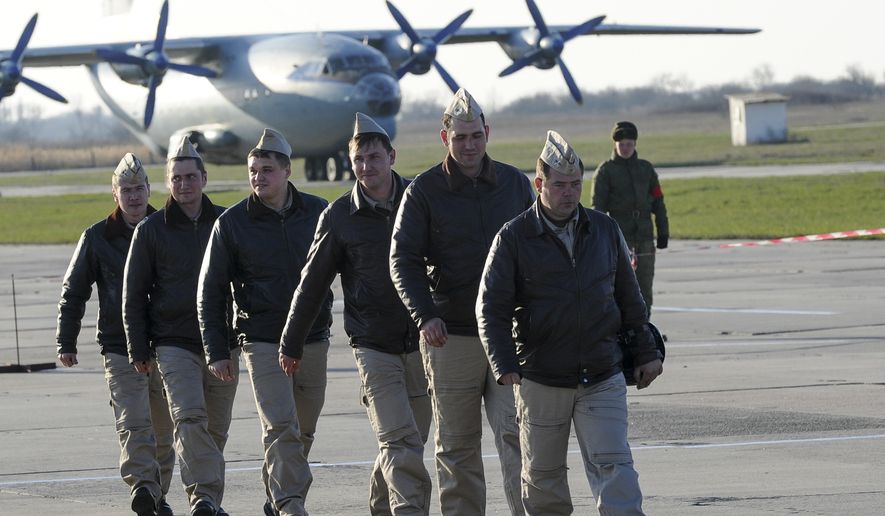After months of condemning Russia’s military incursion into Syria as merely propping up a brutal regime, the Pentagon conceded on Tuesday that President Vladimir Putin’s air force has begun to strike the Islamic State terrorist army.
The Pentagon for months has accused Moscow of being disingenuous by saying it was attacking the Islamic State when in fact it was really bombing rebels opposed to President Bashar Assad.
On Tuesday Pentagon press secretary Peter Cook said: “I think it’s being clear that they have focused more of their military attention on ISIL. We think that is a good thing. We encouraged that from the start. They said initially that their primary goal was to go after ISIL in Syria, and they’re doing so now.”
The change in tune apparently was prompted by Russia’s large role, with Syrian government and Iranian forces, in wresting control of the Syrian city of Palmyra from the Islamic State, also known as ISIL and ISIS.
In the densely confusing picture that is the Syrian civil war, the Obama administration has called for the ouster of Mr. Assad. Yet Washington views the U.S.’ main enemy in the country as the Islamic State, which is also a foe of Mr. Assad as well as a deadly threat outside its territory.
That sharing of enemies prompted Mr. Cook to say the U.S. welcomed the fall of Palmyra, northeast of the capital, Damascus.
“We certainly welcome word of any loss of territory on the part of ISIL, and the ejection of ISIL from parts of Syria we think [is] a good thing,” Mr. Cook said. “We are actively trying to eject ISIL ourselves from parts of Syria.
“At the same time, we have said for some time that the Assad regime is the primary reason for the Syrian civil war, and we think that the Assad regime’s focus should be right now on trying to end that civil war and by engaging in the diplomatic process that’s currently under way,” he said.
Secretary of State John F. Kerry is trying to forge a permanent cease-fire between Syrian rebel and government forces that would lead to some type of new administration in Damascus.
Mr. Cook was asked if the Obama administration would welcome the same joint force — Russian warplanes and Syrian and Iranian ground troops — to move north and try to take Raqqa, the Islamic State’s so-called capital and a siren call for foreign terrorists who want to live in an Islamic caliphate.
“At this point, again, we’re not going to look ahead into the future as to what their military moves might be,” he said. “We know that our focus will be the elimination of ISIL from Syria and Iraq, and our focus is on Raqqa.”
The Obama administration’s strategy for evicting the Islamic State relies on daily airstrikes to kill terrorists and take away their weapons, supplies and cash.
At the same time, U.S. troops in Iraq are training Iraqi government forces, with the next counteroffensive being the retaking of Mosul in the north. Meanwhile, a small team of special operations forces are working with local armies in Syria to try to isolate Raqqa.
All the while Washington has castigated the Russians for virtually ignoring the Islamic Satte and indiscriminately bombing civilian areas.
Air Force Gen. Philip Breedlove, top NATO commander, bluntly said that Mr. Putin was driving more refugees into Europe, calling the herding the “weaponization of immigration.”
“These indiscriminate weapons used by both Bashar al Assad and the nonprecision use of weapons by the Russian forces — I can’t find any other reason for them other than to cause refugees to be on the move and make them someone else’s problem,” Gen. Breedlove told the Senate Armed Services Committee on March 1.
Human rights groups also have pointed to Russia’s use of “dumb bombs,” as opposed to precision-guided munitions. Russian bombs hit clinics, schools and homes, surely causing the deaths of hundreds of innocents.
Now, Mr. Cook said, “I would say it is more constructive than it’s been.”
But do not look for a Russia-U.S. alliance.
“If the Russians continue to focus their efforts on ISIL, we think that would be a good thing,” Mr. Cook said. “But at this point, we’re not at a position to cooperate with Russia in that effort.”
• Rowan Scarborough can be reached at rscarborough@washingtontimes.com.




Please read our comment policy before commenting.